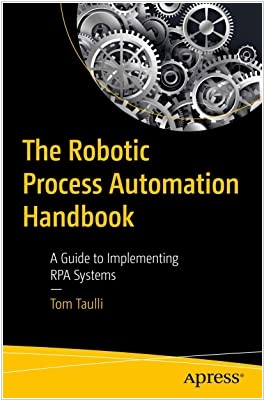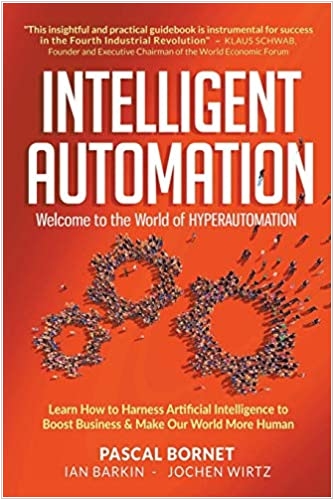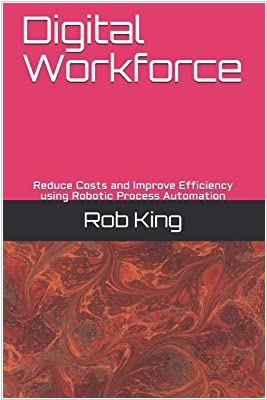3 Best books on RPA
September 05, 2025 | Author: Maria Lin
Here is my list of 3 most interesting books about Robotic Process Automation (RPA):
1. The Robotic Process Automation Handbook: A Guide to Implementing RPA Systems

This book is a comprehensive guide to using RPA for business. It starts with the basics, specifically a simple high-level classification of RPA systems/approaches. These are 1. Attended RPA (the first form of RPA, which appeared around 2003) - suggests that automating software interacts with a human-user to perform specific tasks. A typical example is a call center, where an agent might use an RPA system to look up information while communicating with a customer. 2. Unattended RPA - allows to automate a process without the need for human intervention. A bot is launched when specific event occurs (for example, a customer sends an email requesting an invoice). Typically, unattended RPA is used for back-office functions. 3. Cognitive RPA - uses artificial intelligence, which allows the system to learn over time (for example, when interpreting documents such as invoices). This requires even less human intervention, as the RPA software uses its own inferences and judgments to make decisions.
2. Intelligent Automation: Welcome To The World Of Hyperautomation

This book introduces a new term - IA (do not confuse with AI). IA = Intelligent automation - which is about creating synergies between RPA, low-code platforms, chatbots and AI. IA (according to the author) is one of the most recent trends in artificial intelligence and marks a new revolution - automation of office, white-collar work. Today, office-type roles, such as lawyers, financial controllers or call center operators, make up more than 80% of job positions in the global economy. IA automates intellectual work by imitating five basic human abilities: task execution, language, vision, thinking and learning. Specifically, IA includes various technologies, including machine learning, sentiment analysis, data management, speech recognition, data visualization, image and video analysis, biometrics, intelligent chatbots, smart workflows, low-code platforms, robotic process automation and much more. In this book, the authors examine these IA components in detail and provide examples of their use. They also explain how these technologies integrate into an organization's existing IT environment and how to build a practical IA implementation roadmap.
3. Digital Workforce: Reduce Costs and Improve Efficiency using Robotic Process Automation

This book in particular provides an interesting view at the emergence and development of the RPA market. The author of the book was lucky to see many changes in the industry first-hand since the potential of RPA was recognized in 2012. At that time, only a few of the current market leaders were present. The main leap occurred in 2017, when the RPA market grew to $443 million - almost 2 times compared to the previous year. The market is expected to reach $1.2 billion by 2021. And if we consider the impact of RPA implementation in combination with AI, the forecasts increase to $15.4 billion by 2021. According to the author, the impact of RPA is so great that it is already considered a key factor in the Fourth Industrial Revolution. Society, culture and the economy are already experiencing the changes that RPA technologies bring. The author claims, RPA will bring radical changes to the way we work. Human office workers will be displaced, but new jobs will emerge that require new skills. As automation incorporates learning and intelligence, it will be critical for regulated industries to demonstrate compliance, increasing the demand for data scientists. The number of RPA tools is growing, but it is difficult to imagine new players taking significant market share. They will likely remain niche players, while leaders enter into strategic partnerships or raise large investments to grow. In this environment, newcomers and smaller companies will have a hard time competing.
See also: Top 10 eBook Organizers
1. The Robotic Process Automation Handbook: A Guide to Implementing RPA Systems

This book is a comprehensive guide to using RPA for business. It starts with the basics, specifically a simple high-level classification of RPA systems/approaches. These are 1. Attended RPA (the first form of RPA, which appeared around 2003) - suggests that automating software interacts with a human-user to perform specific tasks. A typical example is a call center, where an agent might use an RPA system to look up information while communicating with a customer. 2. Unattended RPA - allows to automate a process without the need for human intervention. A bot is launched when specific event occurs (for example, a customer sends an email requesting an invoice). Typically, unattended RPA is used for back-office functions. 3. Cognitive RPA - uses artificial intelligence, which allows the system to learn over time (for example, when interpreting documents such as invoices). This requires even less human intervention, as the RPA software uses its own inferences and judgments to make decisions.
2. Intelligent Automation: Welcome To The World Of Hyperautomation

This book introduces a new term - IA (do not confuse with AI). IA = Intelligent automation - which is about creating synergies between RPA, low-code platforms, chatbots and AI. IA (according to the author) is one of the most recent trends in artificial intelligence and marks a new revolution - automation of office, white-collar work. Today, office-type roles, such as lawyers, financial controllers or call center operators, make up more than 80% of job positions in the global economy. IA automates intellectual work by imitating five basic human abilities: task execution, language, vision, thinking and learning. Specifically, IA includes various technologies, including machine learning, sentiment analysis, data management, speech recognition, data visualization, image and video analysis, biometrics, intelligent chatbots, smart workflows, low-code platforms, robotic process automation and much more. In this book, the authors examine these IA components in detail and provide examples of their use. They also explain how these technologies integrate into an organization's existing IT environment and how to build a practical IA implementation roadmap.
3. Digital Workforce: Reduce Costs and Improve Efficiency using Robotic Process Automation

This book in particular provides an interesting view at the emergence and development of the RPA market. The author of the book was lucky to see many changes in the industry first-hand since the potential of RPA was recognized in 2012. At that time, only a few of the current market leaders were present. The main leap occurred in 2017, when the RPA market grew to $443 million - almost 2 times compared to the previous year. The market is expected to reach $1.2 billion by 2021. And if we consider the impact of RPA implementation in combination with AI, the forecasts increase to $15.4 billion by 2021. According to the author, the impact of RPA is so great that it is already considered a key factor in the Fourth Industrial Revolution. Society, culture and the economy are already experiencing the changes that RPA technologies bring. The author claims, RPA will bring radical changes to the way we work. Human office workers will be displaced, but new jobs will emerge that require new skills. As automation incorporates learning and intelligence, it will be critical for regulated industries to demonstrate compliance, increasing the demand for data scientists. The number of RPA tools is growing, but it is difficult to imagine new players taking significant market share. They will likely remain niche players, while leaders enter into strategic partnerships or raise large investments to grow. In this environment, newcomers and smaller companies will have a hard time competing.
See also: Top 10 eBook Organizers



